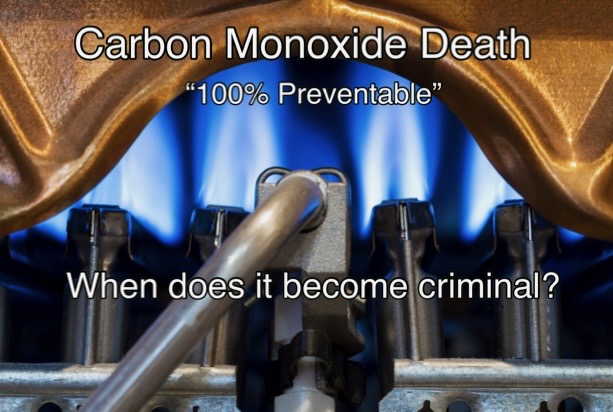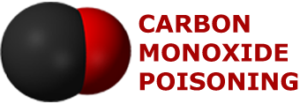When Does Carbon Monoxide Death Become Criminal?
By Rebecca Martin
Charles Suire, 49, suffered a carbon monoxide death on November 28, 2022 in a third floor boiler room at the Victory Inn and Suites, 3750 Washtenaw Avenue in Ann Arbor, Michigan. Perhaps a 2019 YELP review predicted what would eventually be set in motion by the death of Charles Suire.
“Do not book this place. It’s a safety hazard” – 11/18/2019
MLive recounts the incident details of what happened on November 28:
Police were initially contacted to perform a welfare check for a 14-year-old student who lived in the hotel with his mother and father. The student had failed to turn up at school. When the police arrived, they spoke to the student who said he had not gone to school because he was worried about his father. His father, Mr. Suire, was a maintenance worker at the hotel. He had left the previous day around 3pm and failed to return to their lodging.

The November 2022 carbon monoxide death at the Victory Inn and Suites in Ann Arbor, Michigan was found to be 100% preventable by the Michigan Occupational and Safety Administration.
A search began of the hotel to find the missing man. Surveillance tapes revealed that he had entered the boiler room about 3pm and failed to re-emerge. But when police attempted to open the door to the boiler room, it was locked, and the fire department was called in to assist. When they finally gained entry, they discovered Mr. Suire slumped against a wall deceased.
Firefighters were able to measure the presence of the maximum testable value of carbon monoxide at 500ppm. Later, DTE Energy was able to test the levels at 1000ppm. (It is often true when you see round numbers on ambient CO levels, that they were actually higher, but that the meter the technician was using maxed out at these round numbers. This is called pegging a meter.)
After DTE Energy shut off the gas and the hotel guests were relocated to other lodging, air monitoring was conducted, and the building was ventilated. A visual inspection of the property was conducted, and it was discovered that a fallen sheet of steel had fallen and blocked the boiler room ventilation on the roof. The system’s air intake was also blocked by a garbage bag that blocked off the flow of fresh air into the boiler room.
The City Building Department declared the hotel unsafe to occupy until repairs could be made. In addition to the boiler room incident, a building official stated that sanitation issues were of concern as the building did not have running water at the time.
Surveillance tapes revealed that Mr. Suire had not shown any abnormal behavior on entering the boiler room and suicide and foul play were immediately ruled out in the carbon monoxide death.
An autopsy was performed on Mr. Suire, and it was confirmed that Mr. Suire had died of carbon monoxide poisoning.
As a result, a thorough investigation was performed.
MIOSHA Investigation into Carbon Monoxide Death
The most notable of these investigations involved MIOSHA. the Michigan Occupational Safety and Health Administration. This agency works with employers and employees to prevent workplace injuries, illnesses, and fatalities in Michigan. https://www.michigan.gov/leo/bureaus-agencies/miosha
In most cases, an officer will conduct a physical inspection of the workplace. Measurements will be taken if deemed necessary. Conditions that could endanger the safety and health of employees will be identified and documented as they relate to violations of MIOSHA’s standards. Once the inspection is complete a response to any violations will be determined based on the severity of the violations. https://www.linkedin.com/pulse/6-reasons-osha-inspect-your-workplace-gabe-l-sierra#:~:text=Employees%20have%20the%20legal%20right,)%20raised%2C%20and%20other%20factors.
The most serious category of OSHA violations is Willful Violations. These violations are issued in extreme cases:
‘An employer can be issued a Willful Violation if they intentionally violate OSHA regulations or demonstrate severe disregard for their employees’ health and safety. The maximum fine for a Willful violation is $70,000.” https://thestewartlawfirm.net/understanding-the-6-different-types-of-osha-violations/#:~:text=Willful%20Violations%3A%20This%20is%20considered,a%20Willful%20violation%20is%20%2470%2C000.
Six Serious Violations and Two Willful Violations
Following the events at the Victory Inn and Suites, six serious citations and two serious willful-violations were issued by MIOSHA totaling $155,600 in penalties against US 23 Lodge LLC, which operates Victory Inn and Suites.
Two of the fatality-related violations were determined to be of the willful designation based on a prior history of non-compliance with state and municipal fire, boiler and building codes. It was also determined that the employer was fully aware of Mr. Suire’s lack of experience with boiler-type heating systems which indicated the employer had little regard for his health and safety.
Exposure to Fatal Concentrations of CO
The first willful violation Rule 325.51103(a)(iii) was that a worker was exposed to a fatal concentration of carbon monoxide at his job site.
The second willful violation Rule 408.10011(a) was that said employee was not given employer-provided training about the operation, hazards or safeguards associated with a boiler heating system.
“The employer also received six serious citations related to ventilation control, design safety standards for electrical systems, powered groundskeeping equipment, asbestos and not having a hazard communication program in place.https://www.michigan.gov/leo/news/2023/08/22/ann-arbor-hotel-cited-in-carbon-monoxide-death-of-maintenance-worker
Two of the six serious violations were a result of conditions at the scene involving ventilation control, i.e., the piece of metal which was blocking the exhaust from the boiler, and the garbage bag which was blocking the air intake for the boiler room.
The last four serious violations were related to other issues found at the site including safety standards for electrical systems design, disabling safety features of groundskeeping equipment, lack of survey to determine the presence and amount of asbestos and failure of the employer to provide a written hazard program addressing chemicals.
Beyond a Reasonable Doubt Standard Must be Found
Because at least one willful serious violation resulting in a fatality was filed the employer was considered a “severe violator” and as such is eligible for possible criminal charges through the Michigan Attorney General’s office. In general, criminal charges are not brought against an employer unless the government can prove that the employer willfully violated a safety standard and that willful violation resulted in the death of an employee. This is due to provisions in the primary OSH Act. As a result, criminal liability cannot be proven unless it is proven “beyond a reasonable doubt” in criminal proceedings along with other conditions. If an employer is successfully proven to be guilty of a willful violation resulting in an employee’s death, the consequences can be fines or imprisonment. Additionally, an employer can be criminally charged for other reasons such as making false statements to OSHA. https://www.natlawreview.com/article/construction-industry-employers-take-heed-willful-osha-violations-may-lead-to
However, willful violations, even without criminal charges, remain on one’s record and can impact future business ventures negatively.
The conclusion of the inspection by MIOSHA was that this carbon monoxide death was 100% preventable. Whether this case will end up in a criminal court is yet to be seen.

Leave a Reply
Want to join the discussion?Feel free to contribute!